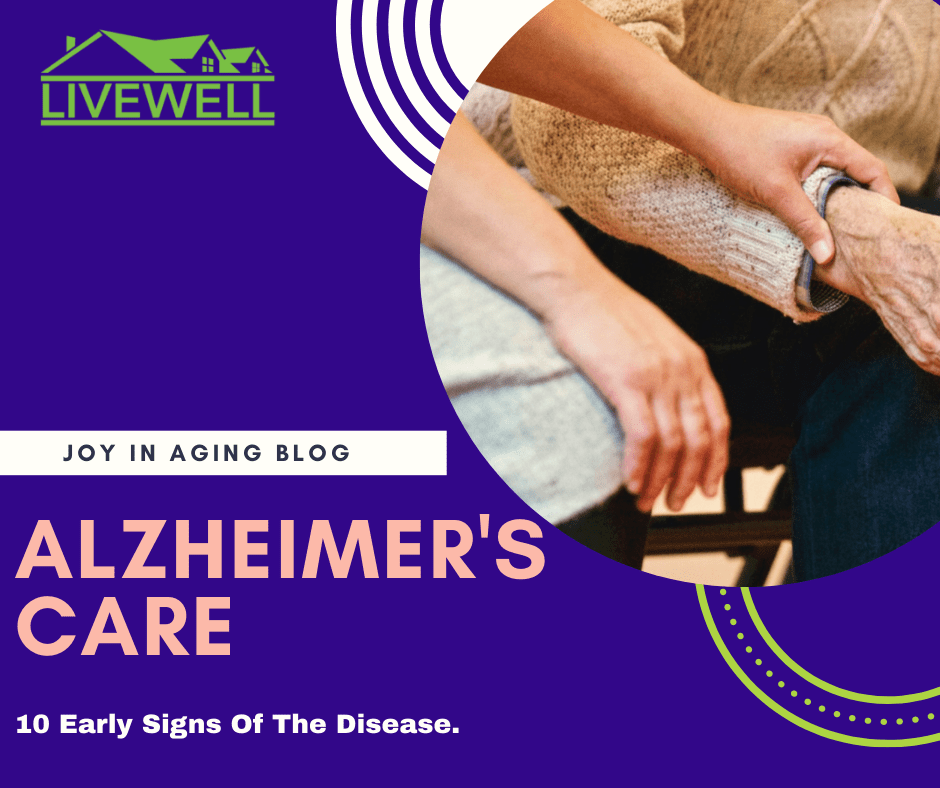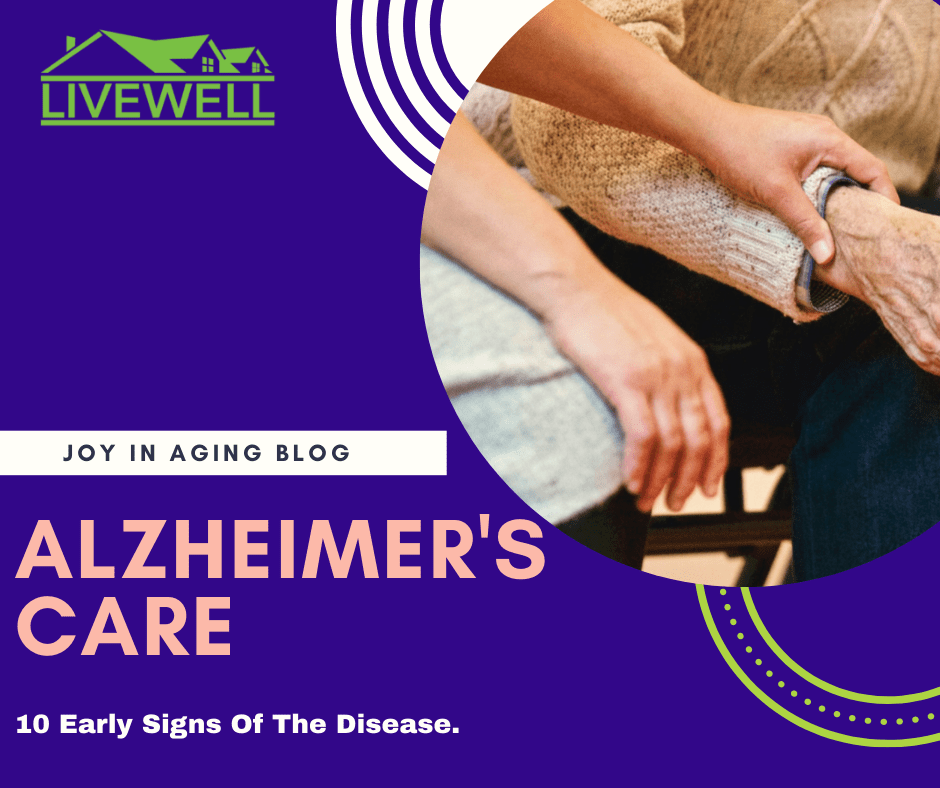Top 10 Early Signs Of Alzheimer’s Disease.


Alzheimer’s Care
What Is Alzheimer’s?
Alzheimer’s is a type of dementia that affects memory, thinking and behavior. Alzheimer’s is a degenerative brain disease that is caused by complex brain changes following cell damage. It leads to dementia symptoms that gradually worsen over time.
It progressively destroys the memory and other mental functions such as thinking and reasoning functions, judgement and decision making, and the ability to carry out some simple tasks.
Facts About Alzheimer’s Disease.
Alzheimer’s disease is named after Dr. Alois Alzheimer. In 1906, Dr. Alzheimer noticed changes in the brain tissue of a woman who had died of an unusual mental illness. Her symptoms included memory loss, language problems, and unpredictable behavior.
After she died, he examined her brain and found many abnormal clumps (now called amyloid plaques) and tangled bundles of fibers (now called neurofibrillary, or tau, tangles).
These plaques and tangles in the brain are still considered some of the main features of Alzheimer’s disease. Another feature is the loss of connections between nerve cells (neurons) in the brain. Neurons transmit messages between different parts of the brain, and from the brain to muscles and organs in the body
In November 1983 President Ronald Reagan designated November as the Alzheimer’s Awareness Month. According to the Alzheimer’s Association, by mid-century, the number of people living with Alzheimer’s dementia in the United States is projected to grow to 13.8 million, fueled in large part by the aging baby boom generation. Alzheimer’s is the sixth leading cause of death in the United States and the fifth leading cause of death in Americans age ≥65 years.
Though the greatest known risk factor for Alzheimer’s is increasing age, the disease is not a normal part of aging. And though most people with Alzheimer’s are 65 and older, approximately 200,000 Americans under 65 have younger-onset Alzheimer’s disease.

Early Warning Signs of Alzheimer’s Disease.
Here are some top 10 early signs of the disease;
- Memory loss that disrupts daily life
Firstly, forgetting important details such as, dates, events or places or forgetting recently learned information. Therefore, most patients would rely more on family members for information or reminder notes.
- Challenges in planning or solving problems
Equally important patients will have symptoms like problem solving math. Again, challenges working through their monthly plan or expenditure. Some of these activities may take them longer to work out.
- Difficulty completing familiar tasks
Those living with Alzheimer’s might find it hard to complete some tasks that they used to do with ease. For instance, they might find it hard fixing a light bulb or cooking, using kitchen ware. It might eventually get to a place where they’d get lost in places that were once quite familiar to them.
- Confusion with time or place
People with Alzheimer’s might fail to track time. Confuse dates, or places. Here’s an informative read about memory and confusion with Alzheimer’s patients, https://www.webmd.com/alzheimers/confusion-delirium.
- Trouble understanding visual images and spatial relations
Difficulty in reading, determining distance. They might also have a problem with determining color and contrast.
- New problems with words in speaking and writing
Have problems with joining and following a conversation. Similarly might have troubles with vocabulary. Have trouble naming familiar objects. They might need use of labels.
- Misplacing things and loosing ability to trace steps
Additionally a person living with Alzheimer’s may put things in an unusual place. They would also have trouble in locating it or retracing steps to look for the item.
- Withdrawal from work or social activities
They may avoid social activities or events or other similar engagements. Likewise, they may give up on hobbies. Failure to complete work assignments.
- Decreased or poor judgement
They might experience changes in judgement or decision–making. A patient with Alzheimer’s Disease may stop cleaning, doing chores or eating.
- Changes in mood and personality
Mood and personality changes are common in people living with Alzheimer’s. They could be anxious, depressed, confused or suspicious. They could be upset even when around friends or family, their moods would fluctuate a lot.
Getting Support
Friends and family members often become the ongoing support system for those loved ones diagnosed with Alzheimer’s. However, you may need support of others along the way. LIVEWELL has caregivers who are trained in memory care and may be able to give you a regular break for self-care and other critical activities http://www.livewellprivatecare.com/our-team-is-ready-trained-and-equipped/.
For In-home care assistance for your loved one or care consultations, our team is ready trained and equipped. Call LIVEWELL Private Care (323) 325–1077 to see what a customized care plan would look like for you or your loved one.
